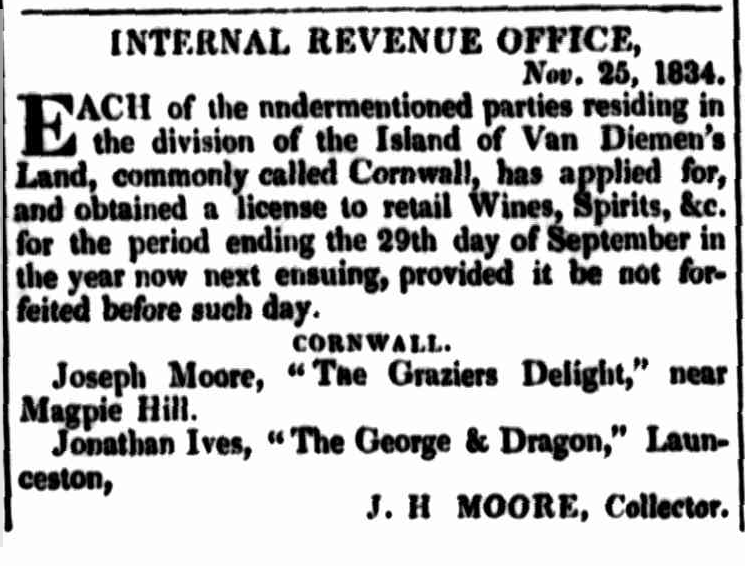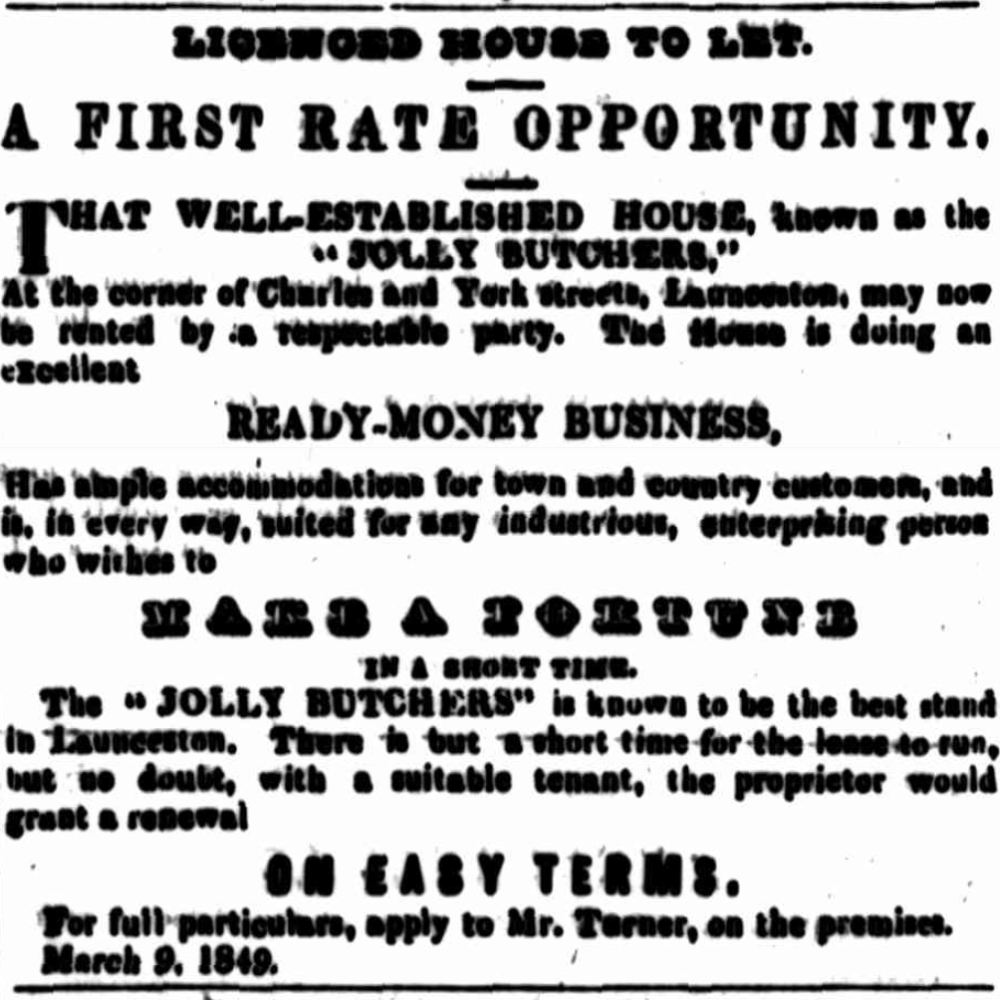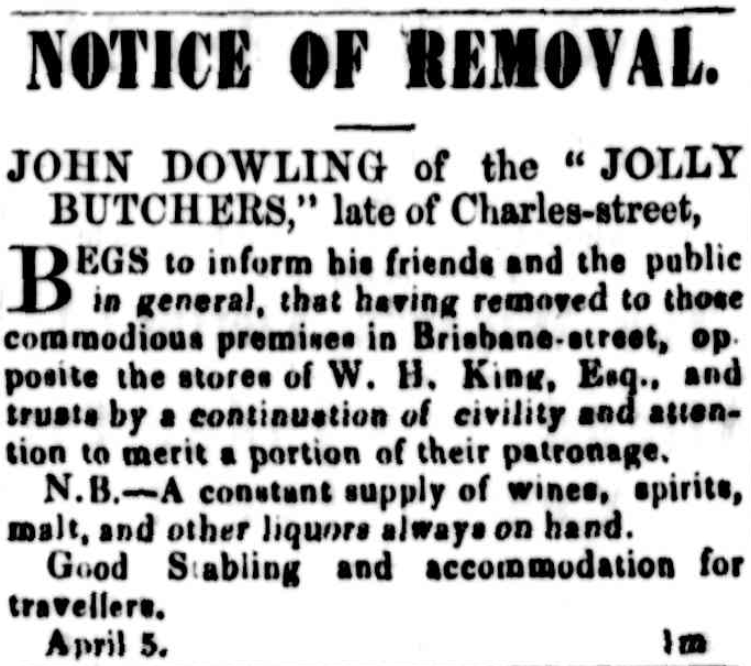Cnr Charles & York Streets
(Not SW corner, as Caledonian Inn is there.)
Note: the George Inn is sometimes referred to as the George & Dragon at this time.
1835-38 Jonathan Ives, George and Dragon, Launceston
1839-44 Jonathan Ives, George and Dragon, Charles and York Streets
1844 Thomas Turner, George and Dragon, Charles and York Streets
1844-49 Thomas Turner, Jolly Butchers, Charles and York Streets
1849-51 John Dowling, Jolly Butchers, Charles and York Streets
Moved to Brisbane Street

To Let,
For a term not exceeding nine years, the Public House at the Corner of Charles and York-street, known as the George and Dragon Inn. The tenant can take the stock on hand or any part of it with the fixtures. The situation needs no comment.
Apply to Mr. Jonathan Ives, on the premises.
June 11.
Cornwall Chronicle,18 June 1842
FOR SALE at the George and Dragon
Inn, at the corner of Charles and York. streets, some of the best draught Sherry ever landed in this Colony, at the price of common Cape wine or black strap, the purchaser can take from one quart to five hundred gallons, at the rate of four shillings per gallon.
Also Brandy of a superior quality, at sixteen shillings per gallon.
Cornwall Chronicle, 27 Janauary 1844
TO BE LET, that old, well-known, and established INN, known by the sign of the “George & Dragon,” at the corner of Charles and York Street, which needs no comment, being in the best thoroughfare in Launceston, and cannot be rivalled.
Person or persons desirous of treating for the same will be compelled to lake a new Billiar Table, recently arrived from London, made to order of the late Thos Reibey, Esq., now in full play; also a small quantity of Plate and Plated Goods, with Furniture, Stock-in-trade, and Bar- fixtures.
Any persons wishing to treat with the undersigned may insure themselves a small fortune in a few years. No persons need apply who cannot meet the terms, which are as follows — £600 cash, or good security for that amount, with interest, payable within six months from this date.
Jonathan Ives.
Jan. 20.
Cornwall Chronicle, 27 Janauary 1844
TRANSFER OF LICENSES. — A meeting of Trustees was held at the Court House, on Monday, the 5th instant, for the purpose of deciding upon the Transfer of Licenses. The following were granted— from Nicholas Clarke to Samuel Story, London Hotel, corner of Cameron and St. John-streets. From Jonathan Ives to Thomas Turner, George and Dragon, corner of York and Charles-streets.
Launceston Advertiser, 9 August 1844
Henry Edwards was indicted for burglariously entering the dwelling of Thomas Turner, on the 25th January, with intent to steal.
The particulars of this case are fully known. The prisoner was found concealed in a bed-room of the “Jolly Butchers.” Before examination it was discovered that a bar had been forced front the window, and access obtained by this means. Upon the person of the person of the prisoners were found a skeleton key, two small wedges, and an iron instrument denominated a “Jemmy,” used in the profession of housebreaking. The evidence was conclusive, and the jury quickly returned a verdict of guilty.
In sentencing the prisoner, his honor remarked that he was evidently a professed burglar. He had been transported originally for that offence, had been tried in the colony for the same crime, and was now again convicted. Being already. under sentence of transportation for life, his honor could not extend the period, but would recommend the prisoner’s removal from the colony.
Edwards said “he had been driven to all of it’, by ill treatment. He was acquitted on the second charge of burglary, but yet received a sentence of three years to Port Arthur, where he was kept seven years. His honor added, “and no doubt deservedly so.”
The prisoner was a third-class probationer, in service at Launceston, but allowed to reside away from his master’s premises. Several house breakings committed about the time of his apprehension were traced to him.
Launceston Examiner, 9 April 1845
From “Annual Licensing Meeting”:
Thomas Turner, Jolly Butcher.–No conviction, disorderly, frequented by bad characters, fair premises.
Launceston Examiner, 5 September 1846
From “Annual Licensing Meeting”:
Thomas Turner, “Jolly Butchers,” corner of Charles and York-streets. Mr. Tarleton felt it his duty to mention that he had good reason to believe that this house was frequented by bad characters – a rendezvous for thieves and prostitutes. Mr. Tarleton then referred to the recent riot in that neighbour- hood, and remarked that Mr. Turner had not rendered the police the assistance he might. Mr. Bart- ley said the same complaint existed last year. The corner was a nuisance, a number of idle disorderly persons were frequently congregated there. Mr. Tarleton said it was known to all that a number of idle persons were always hanging about the corner. Mr. Midgely gave a good character so far as the house was concerned. Mr. Moore said ladies could not walk in the neighbourhood, he had declined to pass himself. Major Wellman said it was the probationers who were allowed to go about town, who used to congregate there. Mr. Douglas had been requested to say a few words for applicant. The complaints ought to be attributed to the neighbour- hood, not to the house; there always had been and always would be crowds collected in that situation; it was the starting place of the coaches, the centre of auction marts, &c. It was impossible for the landlord to prevent such persons from assembling. Mr. D. C. Davis was called; and said that he nightly visited the house, and found it frequented by thieves and prostitutes. On the occasion of the riot the men ran into the house and there planted their sticks. Mr. Turner said “for God’s sake come in Mr. Davis.” Did not think Mr. Turner knew they were bad characters; they were in the habit of drinking and singing in the house. Mr. Moore would support the constituted authorities. Mr. Wales thought it was impossible for a landlord to prevent such men from drinking in his house. Mr. Turner would defy any one to say that ever he encouraged bad characters. Mr. Bartley said he had been cautioned last year, and referred to the case of Childs who was deprived of his license, and employed Mr. M’Dowell for the appeal, but that gentleman, with all his eloquence, failed to convince the justices, that the rendezvous of thieves and gamblers was a fit place to be licensed. Mr. Douglas pointed out the essential difference in the two cases to which Mr. Bartley assented. The votes were taken – for 7 ; against 11.
The moment after this decision the question was re-opened, and the discussion continued for some time. Mr. Wales said it was hard to censure a publican because people collected about his house, and in this case he saw no ground of objection, if Mr Turner did not knowingly encourage the bad characters. He remembered that a similar complaint was made against a house at Evan- dale, and the fellows consequently congregated at the Rev. Mr. Wilkinson’s corner, where the nuisance was quite as great, and Mr. Wilkinson might just as well have been blamed as the publican. Mr. Tarleton thought no man could mistake the character of a prostitute if he might of a thief. Lieut. Friend did not desire to reflect upon the character of the appli- cant: the Police Magistrate entertained the same view: Mr. Bartley the same – they objected to the conduct of the house. Mr. Kennedy wished to know what he should record as the ground of refusal, as if character or conduct were passed as the objection it would deprive applicant of the power of applying for other premises. Mr. Gunn spoke favourably of the applicant’s character founded upon a knowledge of 12 years. The votes were taken as to the ground of objection, and stood as follows:- conduct, 2; conduct and premises, 4; premises, 5. This produced a difficult arithmetical problem : adding the “con ducts” together the product is 6 ; but adding the “premises” together the result is 9: then the perplexing anomoly was discovered that, by this system of computation, eleven justices had given fifteen votes, although they only voted once each. It was deter- mined at last that a majority having voted for “con- duct” it should be so recorded: this having the effect of preventing the applicant from applying at the Quarterly Meeting, Mr. Gunn said, rather than inflict such injustice he would recall his vote, and give it in favour of the renewal of the licence: Mr. Robertson should do the same. This would have reversed the original decision, so Mr. Bartley said, rather than this should be the result he would alter his vote from “conduct” to “premises;” and Mr. Jennings having followed his example, it was then recorded – no, it wasn’t – it was just going to be recorded – that Mr. Turner had been deprived of his licence on account of his “premises,” when another difficulty threatened to protract the discussion; was the objection to the “situation” of the premises or the “accommodation ?” They had licenced a house immediately opposite, and less commodious. This difficulty would not easily have been obviated but for a shrewd suggestion, from whom emanating our notes do not state, that as the Act only used the word “premises,” the safest course was to put it down so, no matter what it signified – and so at last it was put down. Permission was reserved for the applicant to apply at the quarterly meeting for any other premises.
Launceston Examiner, 3 September 1847
ADJOURNED LICENSING MEETING.-Appeal.–Mr. Turner of tile “Jolly Butchers,” appealed against the decision of the annual licensing meeting, by which he was deprived of his license. The following justices were present–Messrs. W. H. Breton, chairman; W. Tarleton, R. Wales, W. G. Sams, Captain Bateman, James Robertson, J. Penny, Captain Stewart, Major Wellman, J. Sinclair, F. Evans, T. Bartley, Dr. Salmon. Mr. Tarleton voted against the licence because he considered the house a public nuisance; but the other justices without an exception voted in its favour, although some of them opposed It at tile. former meeting. The decision was therefore reversed, although nothing was stated that at all altered the features of the case, a feeling having evidently been induced by reflection, that the refusal of the application would be great hardship.
Launceston Examiner, 18 September 1847
From “Annual Licensing Meeting”:
Turner, Thomas, ‘Jolly Butchers,’ Charles and York-streets ; well conducted, clean and orderly.
Launceston Examiner, 2 September 1848

